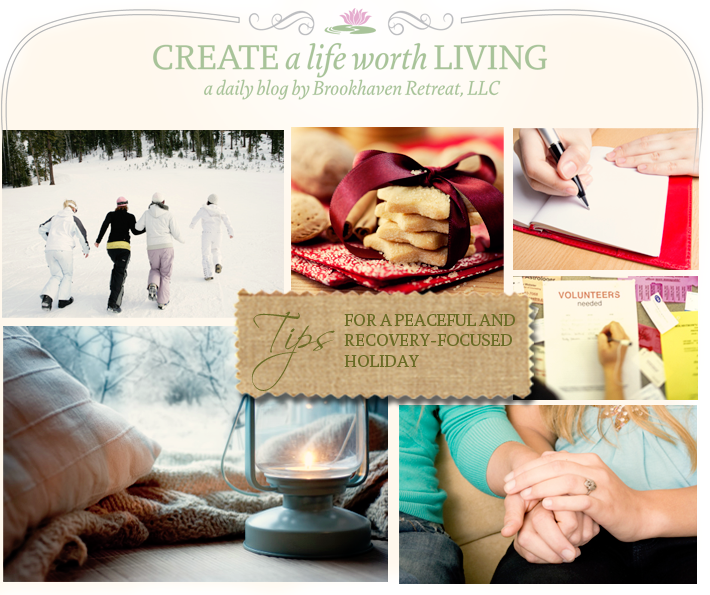
The holidays can be a very difficult time for those of us in recovery. We may struggle with the emphasis on spending time with family members, the focus on an endless variety of foods and eating traditions, social events involving alcohol, as well as emotional highs and lows. These can present a number of challenges to any type of recovery.
Take a deep breath and ask yourself what kind of holiday you want to have? Would you like for it to be different from past years? Are there traditions you have missed? Are the people around you supportive or enabling? What can you control in order to have the best holidays possible?
Here are a few tools to help you have a more peaceful and recovery-focused holiday:
- Predict times of high stress and places that cause you high stress or anxiety. In other words, be prepared and make choices about where you will attend and where you won’t ahead of time and stick to your plans.
- Plan self-care time, time to regenerate and relax and refocus on your recovery. This may be taking a walk, going to the movies, attending a meeting, calling a friend, meditation time, or anything else that gives you a time out to recharge.
- Plan to eat three meals a day and continue your regular exercise routine to help reduce the chance of a binge or focusing on food too much and allow you to maintain the structure you have created.
- Allow yourself some “treats”. Deprivation is not self-care and is more likely to lead to resentments, binges, or further restrictions.
- Make a phone list and carry it with you so you can make support calls whenever you need to.
- Go to meetings and support groups.
- Think about doing some volunteer work to reach out to others and be able to let go of the self-focus that can sabotage our recovery.
- Consider making an extra effort to begin each day with some prayer and meditation, even if just for 10 minutes. This can set the tone for the day and be something that can help you to find your balance again quicker when needed later in the day.
- Make a plan about boundaries that may need to be set with others.
- Make use of coping or positive self-talk statements. This can include “I have a right to say no,” “I know I can handle this situation,” “I am honoring my recovery by making this choice,” “I am worth taking special care of myself during this season”, and “I don’t have to do this perfectly but can focus on doing a few positive healthy things each day.” You can also follow this up with a gratitude list at the end of each day, no matter how small it may be.
- Remember that it is only you that remains responsible for your health and recovery, not family, friends, partners or sponsors.
Wishing you all a healthy and peaceful holiday season!
























































